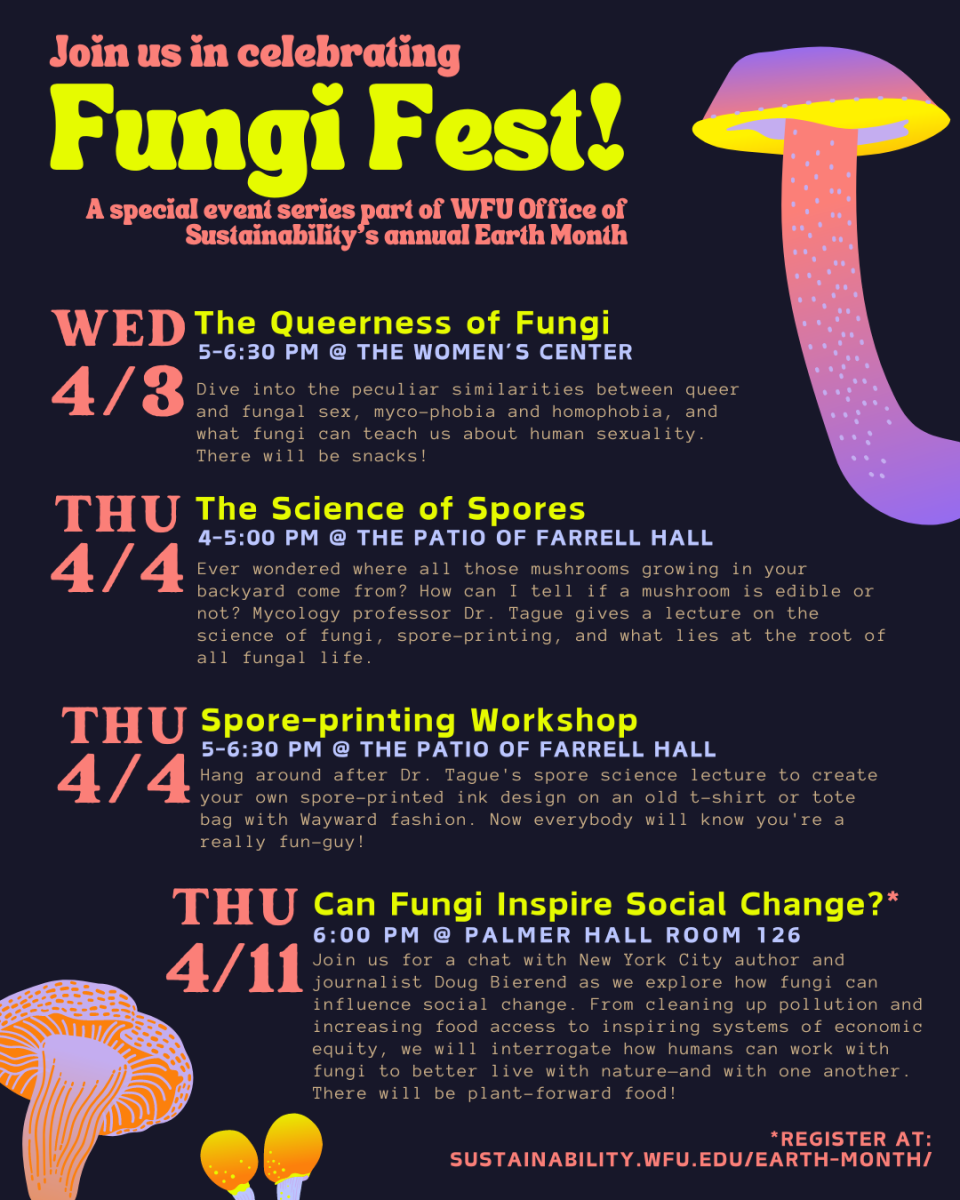Earthworms have long been a symbol of healthy, nutrient-rich soil. However, many earthworm species inhabiting the United States soil are invasive. As global temperatures rise and pollutants accumulate in the atmosphere — warming the soil of temperate forests — earthworms migrate further north.
At Wake Forest, Professor of Biology Dr. Wayne Silver began research on earthworms to determine how they sense stimulants — specifically, chemical irritants — through chemesthesis. Silver retired last year after working 38 years in Wake Forest’s biology department. His lab has greatly impacted ecology research in chemesthesis today, and students continue to contribute to his research.
According to Silver, “Chemesthesis is the sense of irritation produced by chemicals which activate pain nerve fibers.”
All organisms have senses that allow for the detection of and reaction to stimuli. Our sense of taste as humans, for example, is stimulated when we eat sugar, which has chemical properties that produce a sweet taste, activating our taste nerve fibers. In contrast, chemesthetic stimuli have chemical properties that activate pain nerve fibers.
“When you bite into a chili pepper, your mouth feels like it’s on fire,” Silver said. “When you put wasabi on your sushi, there’s a burn in the back of your nose. Have you ever cut an onion? It burns your eyes. That’s chemesthesis.”
Silver continued: “If you actually measure the temperature of your mouth, it hasn’t changed at all. Your brain doesn’t know that something hot is in your mouth — all it knows is those heat receptors have been activated.”
Prior to Silver’s studies at Wake Forest, little research had been done on an earthworm’s ability to sense, especially in regard to sensing heat and pain through chemesthesis.
“Although they may seem really small, earthworms are really important to the ecosystem,” Wilder said. “Knowing that earthworms are able to detect chemicals and whether or not they want to be in certain soil is crucial for understanding soil composition. It’s also important to understand the aversion of these earthworms to certain chemicals to understand how these types of changes to soils are going to affect the rest of the ecosystem.”
— Abby Wilder, Class of 2024
“This was very surprising to me because earthworms are supposed to be [ecologically] important animals,” Silver said. “Some people have claimed that they play as big a role in agriculture as honeybees. Aristotle called earthworms the intestines of the soil. Earthworms were [Charles] Darwin’s favorite animals.”
According to “Cancel Earthworms,” an article published by “The Atlantic,” earthworms in North America had been wiped out by the ice age that lasted until 10,000 years ago. In the last hundred years, humans have intentionally and unintentionally reintroduced earthworms to North America, many of which have been brought by settlers or in shipments, plants and livestock. Their return has disrupted the food chains of organisms native to the United States.
Climate change is also affecting the migration patterns of earthworms. As the soil of northern temperate forests in the U.S. and Canada warms, earthworms have moved even further north, interfering with these ecosystems. Further, pollutants from runoff and emissions released by factories directly affect the behavioral patterns of earthworms.
To accompany Silver’s study on chemesthesis, undergraduate biology students have looked at how earthworms detect Roundup, a weed killer. This study could reveal how earthworms react to fertilizers and other pollutants in the atmosphere killing earthworms or causing disturbed migration patterns.
“[Roundup] really negatively affects how earthworms live in the soil,” said Olivia Laun, a senior biology major and member of Silver’s lab. “They will die or try to escape the soil whenever the weed killer is applied, even in lower concentrations.”
Laun continued: “That’s why we’re looking at neuropeptides and how they can either speed up or slow down the rate of digestion and if that has an impact on the soil and how fast they’re able to cycle nutrients.”
According to Laun, earthworms have a linear structure and rely on the process of peristalsis, the contraction of passing food through the digestive system. By dissecting the worm, Laun and other students are able to measure the earthworm’s contractions and how compounds affect their behavior.
Abby Wilder, a senior biology major, was a research assistant for Silver in the fall of 2021. She studied earthworms on a molecular level to examine how compounds from soil affect their digestive systems.
“I worked on putting different chemicals in the soil to see if the worms would burrow or not,” Wilder said. “If they were sensitive to those chemicals, they would not burrow. We were able to take different concentrations of chemicals and different amounts to test the result of these compounds on the earthworms.”
Wilder enjoyed researching earthworms and learned the full extent to which earthworms affect our environment by participating in this lab.
He was a fantastic mentor and also a fantastic person. I will always remember Silver’s passion for teaching and passion for giving students opportunities to express themselves and to be able to do science.
— Leo Silenzi, Wake Forest alumni
“Although they may seem really small, earthworms are really important to the ecosystem,” Wilder said. “Knowing that earthworms are able to detect chemicals and whether or not they want to be in certain soil is crucial for understanding soil composition. It’s also important to understand the aversion of these earthworms to certain chemicals to understand how these types of changes to soils are going to affect the rest of the ecosystem.”
Because earthworms offer several benefits to gardens and agriculture, knowing what chemicals repel and/or attract earthworms can inform people on what fertilizers to use in their gardens and when farming for a sustainable ecosystem.
“If you can produce more food, you’ll make people happy,” Silver said. “They talk about what happens if the honeybees die…we’re in real trouble. Same thing you can argue with earthworms.”
Leo Silenzi is a Wake Forest alumni who worked in Silver’s lab as an undergraduate student. He believes Silver’s work significantly contributed to the field of ecology and the world’s knowledge of chemoreception.
“His lasting impact on the field and on his students will be remembered by Wake Forest,” Silenzi said. “I know I will carry his academic advice with me for a long time.”
Silenzi describes his experience working with Silver as invaluable, and he attributes much of his success post-graduation to Silver.
“He was a fantastic mentor and also a fantastic person,” Silenzi said. “I will always remember Silver’s passion for teaching and passion for giving students opportunities to express themselves and to be able to do science.”







